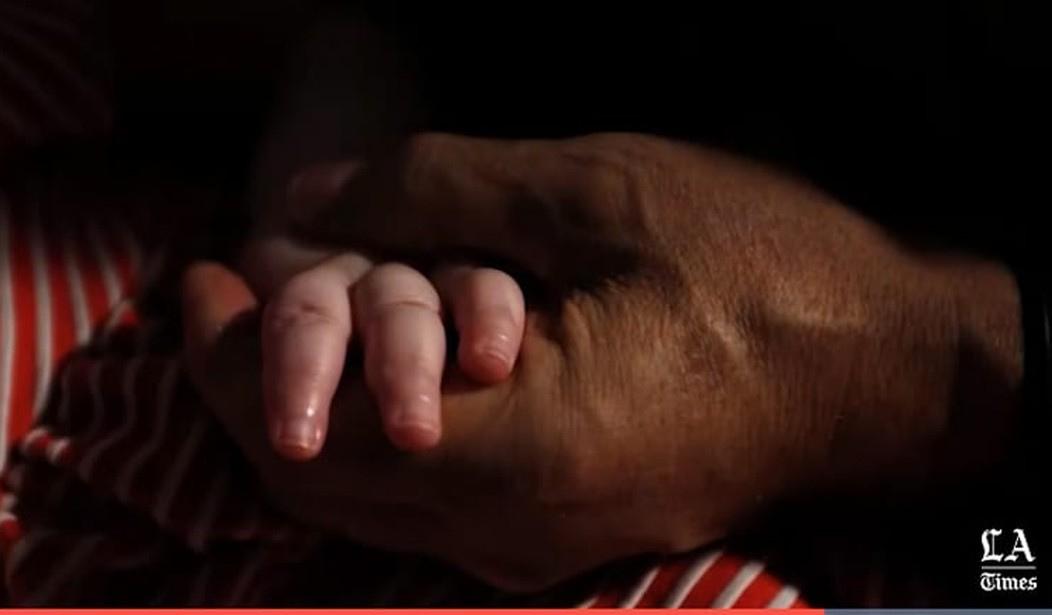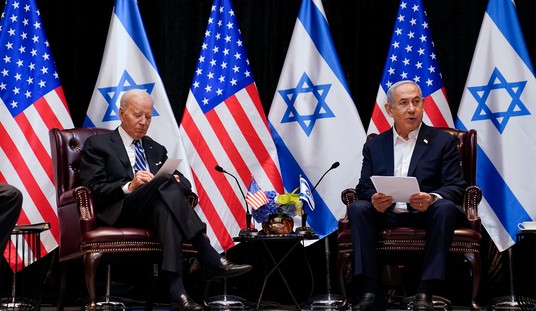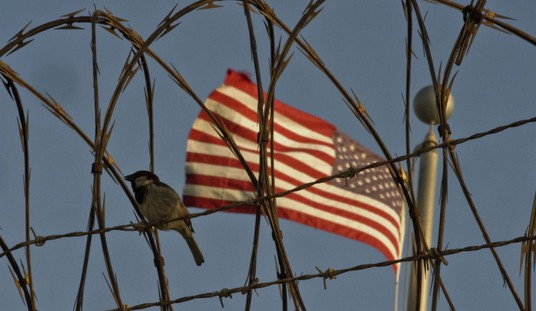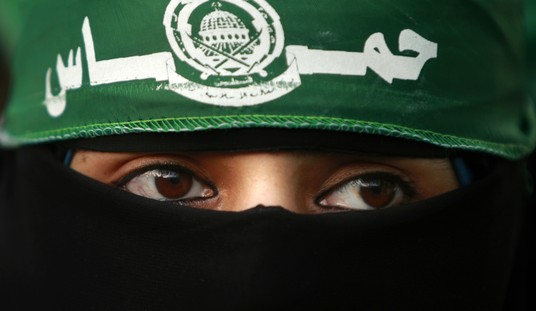I know he wouldn’t admit it, but every day has to be devastating for foster parent Mohamed Bzeek. That’s because he has chosen a tough, heart-wrenching vocation. The quiet, devout, Libyan-born Muslim has for more than two decades been a father to terminally ill children in Los Angeles County’s foster care system. And as a long profile in the Los Angeles Times makes clear, he is very good at what he does. Bzeek reportedly has buried about ten children — some of whom died in his arms — yet still maintains the patience and empathy to do what even the children’s parents can’t or won’t do.
Bzeek is presently taking care of a bedridden 6-year-old foster girl with a rare brain defect. Blind and deaf, she has daily seizures and her arms and legs are paralyzed. The 62-year-old’s vocation is to make sure children like her know “they’re not alone in life.”
“I know she can’t hear, can’t see, but I always talk to her,” he said. “I’m always holding her, playing with her, touching her. … She has feelings. She has a soul. She’s a human being.”
There is a dire need for foster parents to care for such children.
And there is only one person like Bzeek.
“If anyone ever calls us and says, ‘This kid needs to go home on hospice,’ there’s only one name we think of,” said Melissa Testerman, a DCFS intake coordinator who finds placements for sick children. “He’s the only one that would take a child who would possibly not make it.”
Typically, she said, children with complex conditions are placed in medical facilities or with nurses who have opted to become foster parents.
Yousef said that Bzeek is the only foster parent in the county known to take in terminally ill children, and clearly, he is valued for that. These are children whose own parents, in many cases, don’t want to care for them.
The girl sits propped up with pillows in the corner of Bzeek’s living room couch. She has long, thin brown hair pulled into a ponytail and perfectly arched eyebrows over unseeing gray eyes.
Because of confidentiality laws, the girl is not being identified. But a special court order allowed The Times to spend time at Bzeek’s home and to interview people involved in his foster daughter’s case.
The girl’s head is too small for her 34-pound body, which is too small for her age. She was born with an encephalocele, a rare malformation in which part of her brain protruded through an opening in her skull, according to Dr. Suzanne Roberts, the girl’s pediatrician at Children’s Hospital Los Angeles. Neurosurgeons removed the protruding brain tissue shortly after her birth, but much of her brain remains undeveloped.
She has been in Bzeek’s care since she was a month old. Before her, he cared for three other children with the same condition.
“These kids, it’s a life sentence for them,” he said.
Bzeek, the oldest of 10 children, came to this country from Libya as a college student in 1978. Years later, he married Dawn, who had been a foster parent in the early 1980s. Dawn, who loved every child she took in, and treated them like her own, was Bzeek’s inspiration. They went on to open their home to dozens of children.
They taught classes on foster parenting — and how to handle a child’s illness and death — at community colleges. Dawn Bzeek was such a highly regarded foster mother that her name appeared on statewide task forces for improving foster care alongside doctors and policymakers.
Bzeek started caring for foster children with Dawn in 1989, he said. Often, the children were ill.
Mohamed Bzeek first experienced the death of a foster child in 1991. She was the child of a farm worker who was pregnant when she breathed in toxic pesticides sprayed by crop dusters. She was born with a spinal disorder, wore a full body cast and wasn’t yet a year old when she died on July 4, 1991, as the Bzeeks prepared dinner.
“This one hurt me so badly when she died,” Bzeek said, glancing at a photograph of a tiny girl in a frilly white dress, lying in a coffin surrounded by yellow flowers.
The Bzeeks began caring exclusively for terminally ill children in the mid-1990s. These were children who had “do not resuscitate” orders because they could find no one to take them in. Providing them with a comfortable home and as much love as they would give their own child, the Bzeeks treated them with the dignity that the sanctity of their short lives deserved.
“The key is, you have to love them like your own,” Bzeek said recently. “I know they are sick. I know they are going to die. I do my best as a human being and leave the rest to God.”
Bzeek’s only biological son, Adam, was born in 1997 — with brittle bone disease and dwarfism. He was a child so fragile that changing his diaper or his socks could break his bones.
Bzeek said he was never angry about his own son’s disabilities. He loved him all the same.
“That’s the way God created him,” Bzeek said.
Now 19, Adam weighs about 65 pounds and has big brown eyes and a shy grin. When at home, he gets around the house on a body skateboard that his father made for him out of a miniature ironing board, zooming across the wood floor, steering with his hands.
Adam studies computer science at Citrus College, driving his electric wheelchair to class. He’s the smallest student in class, Bzeek said, “but he’s a fighter.”
Adam’s parents never glossed over how sick his foster siblings were, and they told him the children were going to eventually die, Bzeek said. They accepted death as part of life — something that made the small joys of living all the more meaningful.
“I love my sister,” the shy teenager said of the foster girl. “Nobody should have to go through so much pain.”
Dawn eventually became seriously ill herself around the year 2000. The frustrations of her illness wore on her and became a strain on their marriage, the Times reported. The Bzeeks split up in 2013 and Dawn died about a year later.
Now it’s hard for Bzeek to talk about her without choking up. She was the stronger one of the two when it came to facing the difficulties of the children’s illnesses, he told the Times.
Bzeek recently brought the girl to Children’s Hospital on Sunset Boulevard because she was sick with a cold.
He pushed the wheelchair-bound girl, wrapped in a soft pink blanket, and the IV pole that carries her feeding formula, into the hospital on a chilly November morning.
On the elevator, her face glowed bright red as she coughed, her throat filled with phlegm, screaming for air. People in the elevator looked away.
Bzeek rubbed her cheek playfully and held her hand, waving it playfully. “Heeeey, mama,” he cooed in her ear, calming her down.
For Bzeek, the hospital has become a second home. When he’s not here, he’s often on the phone with her many doctors, the insurers who fight over who’s paying for it all, the lawyers who represent her and her social workers. Any time they leave the house together, he carries a thick black binder filled with her medical records and pages of medications.
When Dr. Roberts entered the exam room, she smiled at “the girl’s frilly socks and brown dress with fall-colored leaves.”
“There’s our princess,” the doctor said. “She’s in her pretty dress, as always.”
Roberts has known Bzeek for years and has seen many of his foster children. By the time this girl was age two, Roberts said, doctors said there were no more interventions to improve her condition.
“Nobody ever wants to give up,” she said. “But we had run through the options.”
But the girl, who is hooked to feeding and medication tubes at least 22 hours a day, has lived as long as she has because of Bzeek, the doctor said.
“When she’s not sick and in a good mood, she’ll cry to be held,” Roberts said. “She’s not verbal, but she can make her needs known. … Her life is not complete suffering. She has moments where she’s enjoying herself and she’s pretty content, and it’s all because of Mohamed.”
Other than trips to the hospital and Friday prayers at the mosque — when the day nurse watches her — Bzeek rarely leaves the house.
In early December, Bzeek, Adam, and the girl’s nurse, Marilou Terry, celebrated the child’s sixth birthday with a special birthday lunch.
Bzeek invited her biological parents to the celebration. They didn’t come.
But that didn’t dampen her foster father’s spirit.
Bzeek crouched in front of the girl — wearing a long, red-and-white dress and matching socks — and held her hands, clapping them together.
“Yay!” he said, cheerfully. “You are 6! 6! 6!”
Bzeek lit six birthday candles in a cheesecake and sat the girl on the kitchen table, holding the cake near her face so she could feel the warmth of the flames.
As they sang “Happy Birthday,” Bzeek leaned over her left shoulder, his beard gently brushing the side of her face. She smelled the smoke, and a small smile crossed her face.
Can a foster father be Father of the Year? Because if anyone deserves that honor and distinction, it’s Mohamed Bzeek.








Join the conversation as a VIP Member